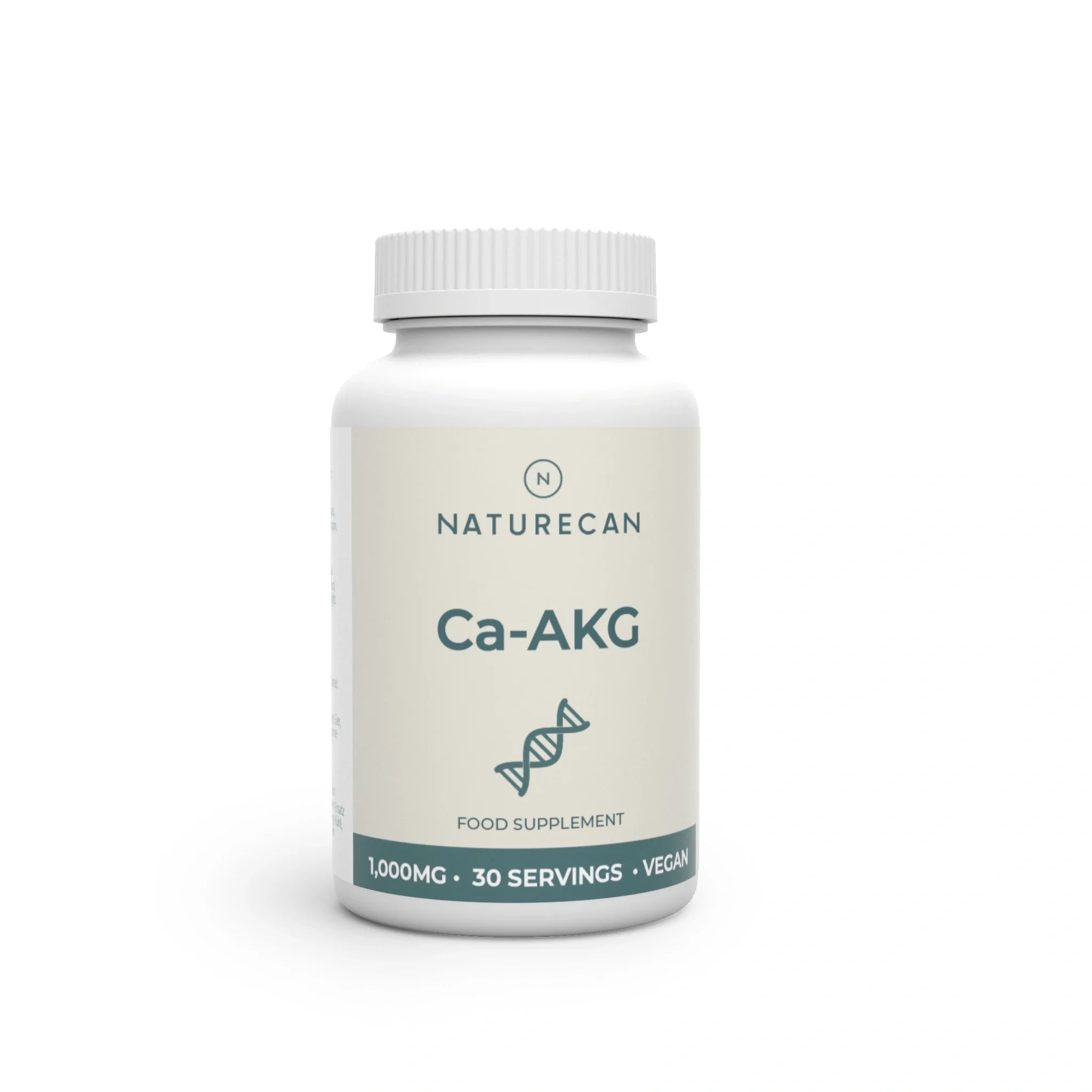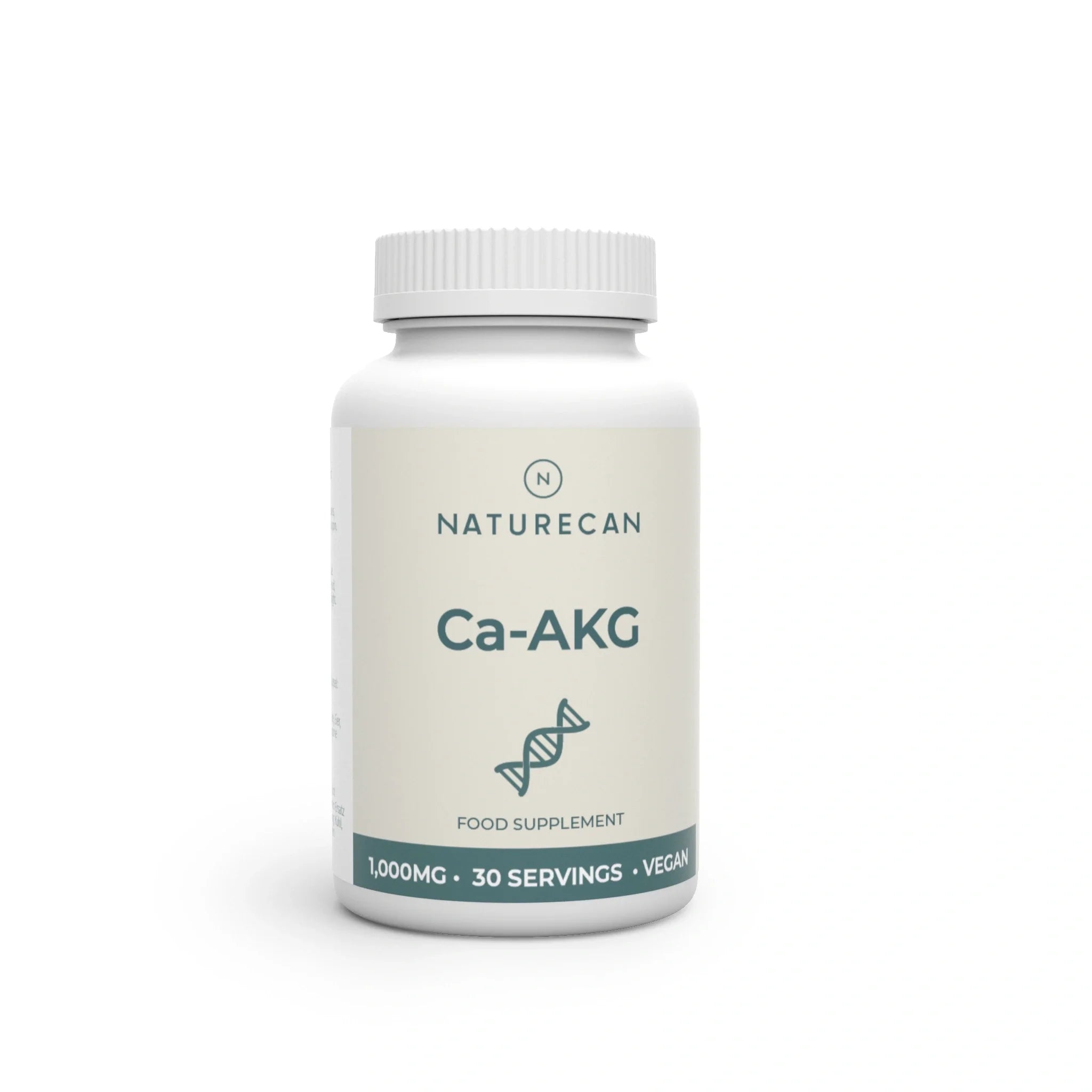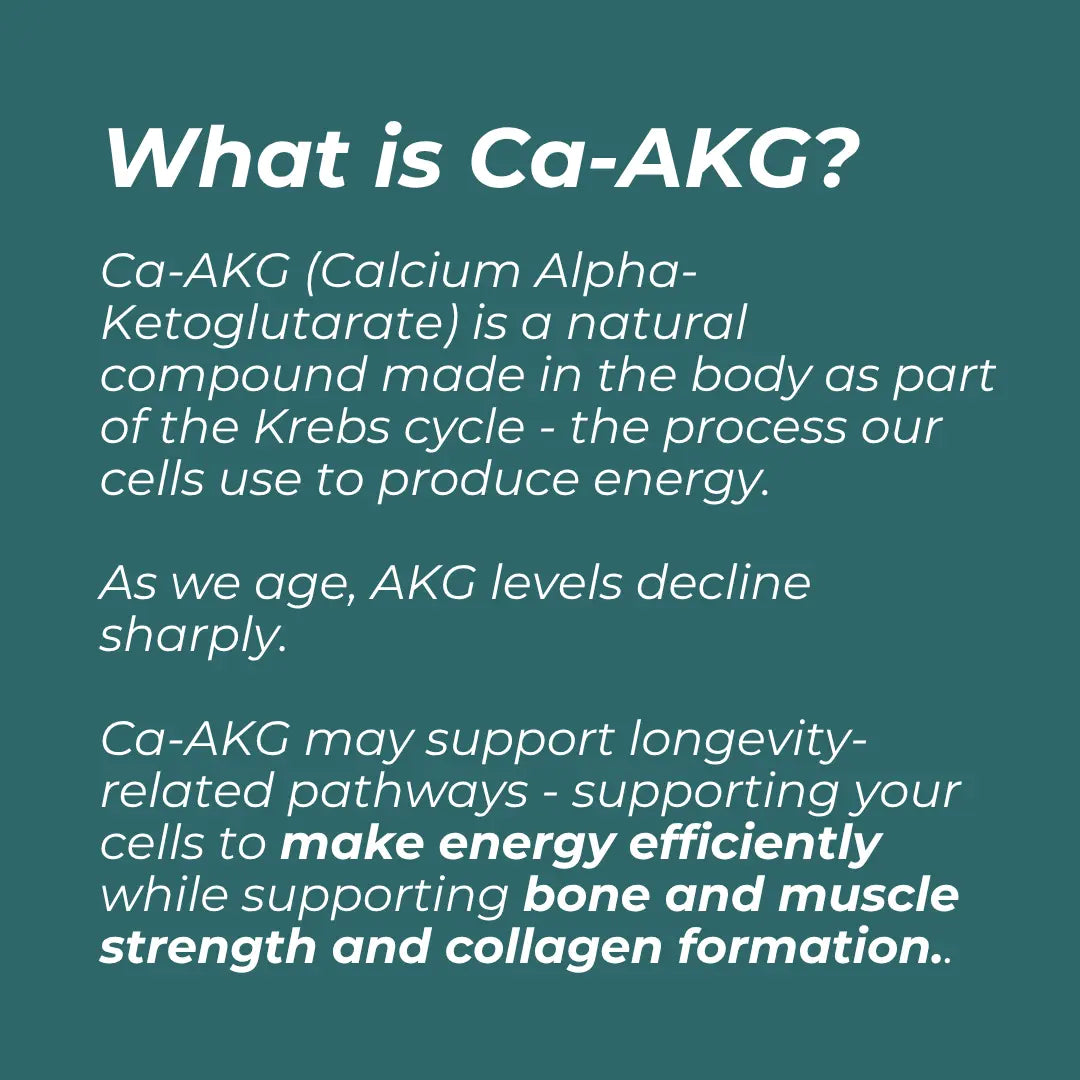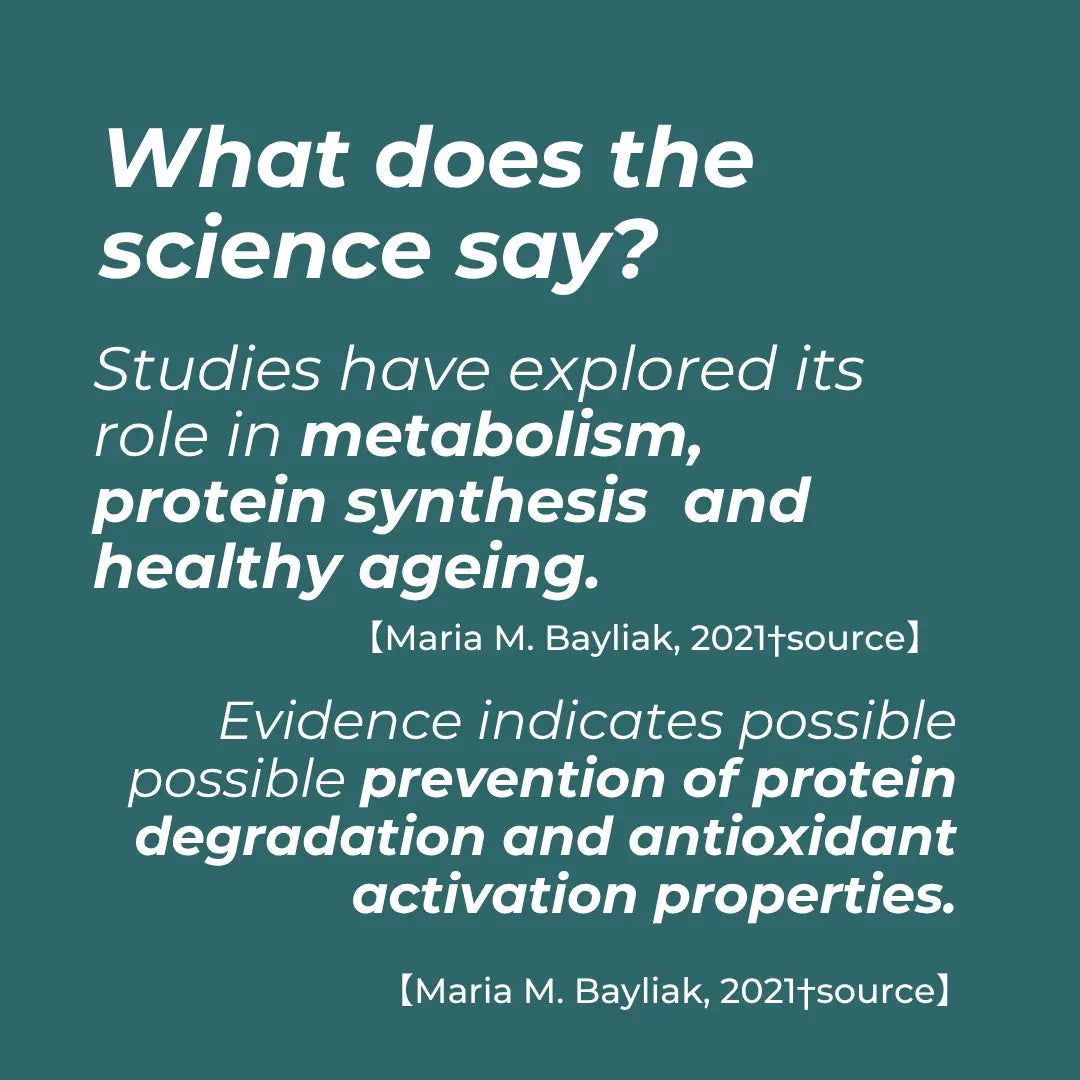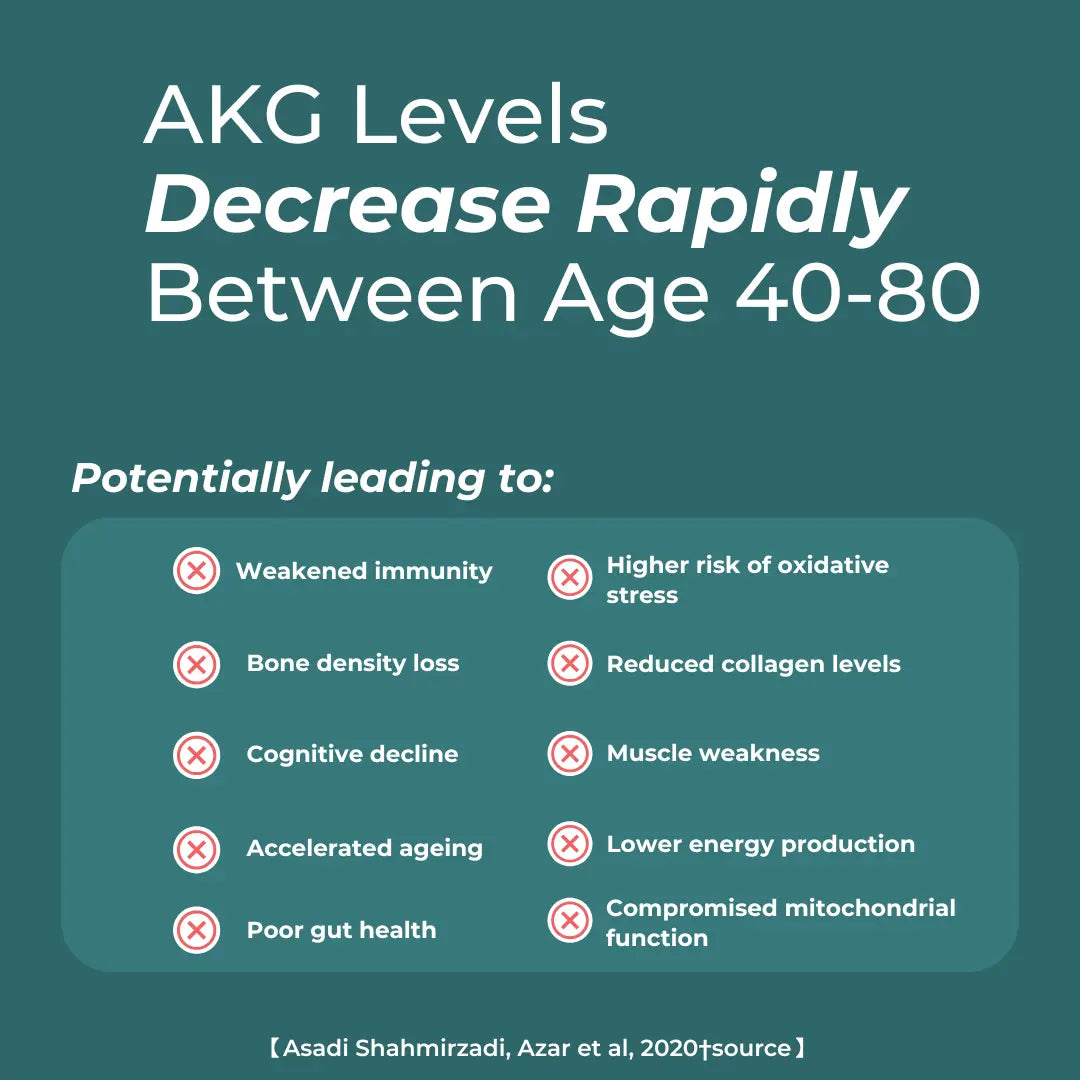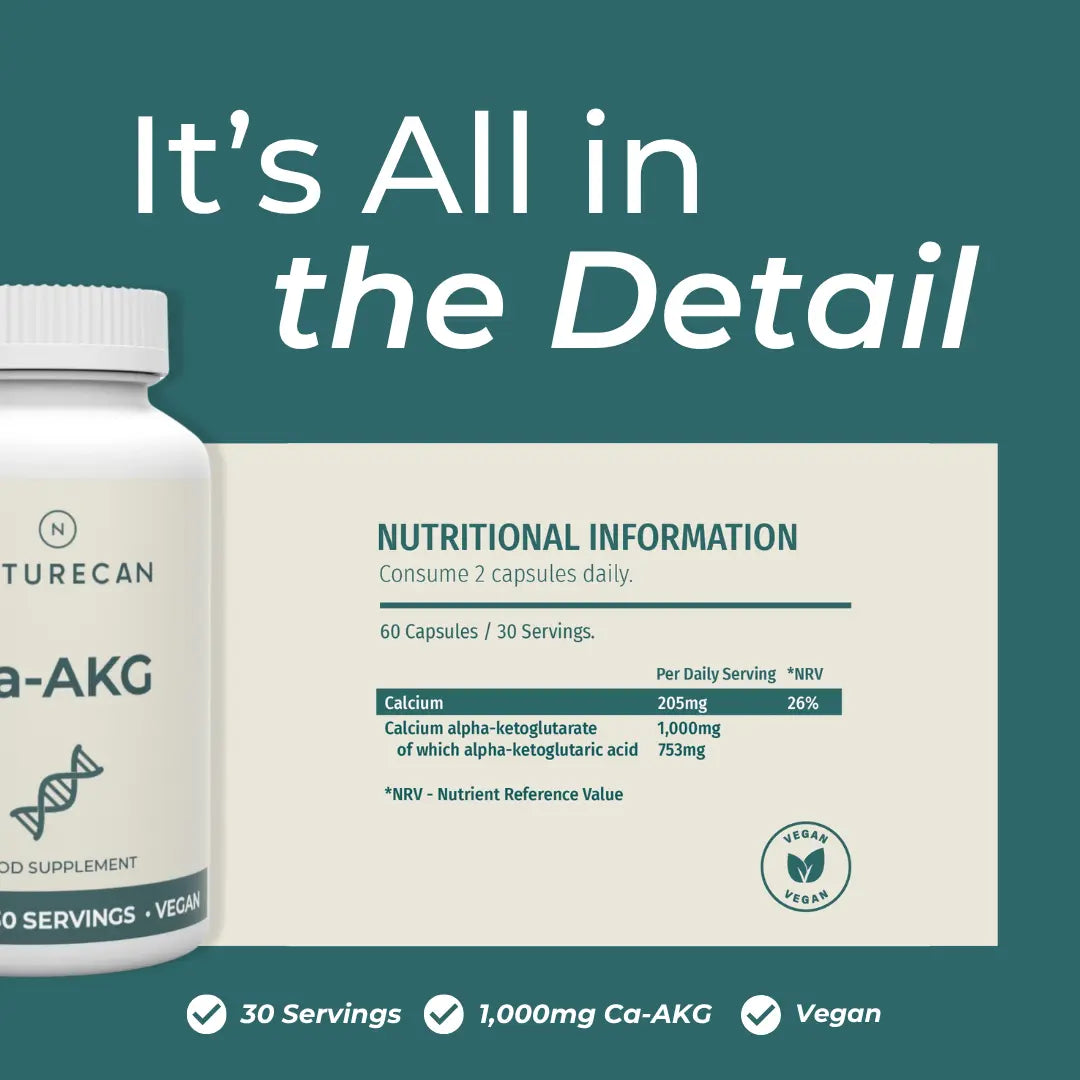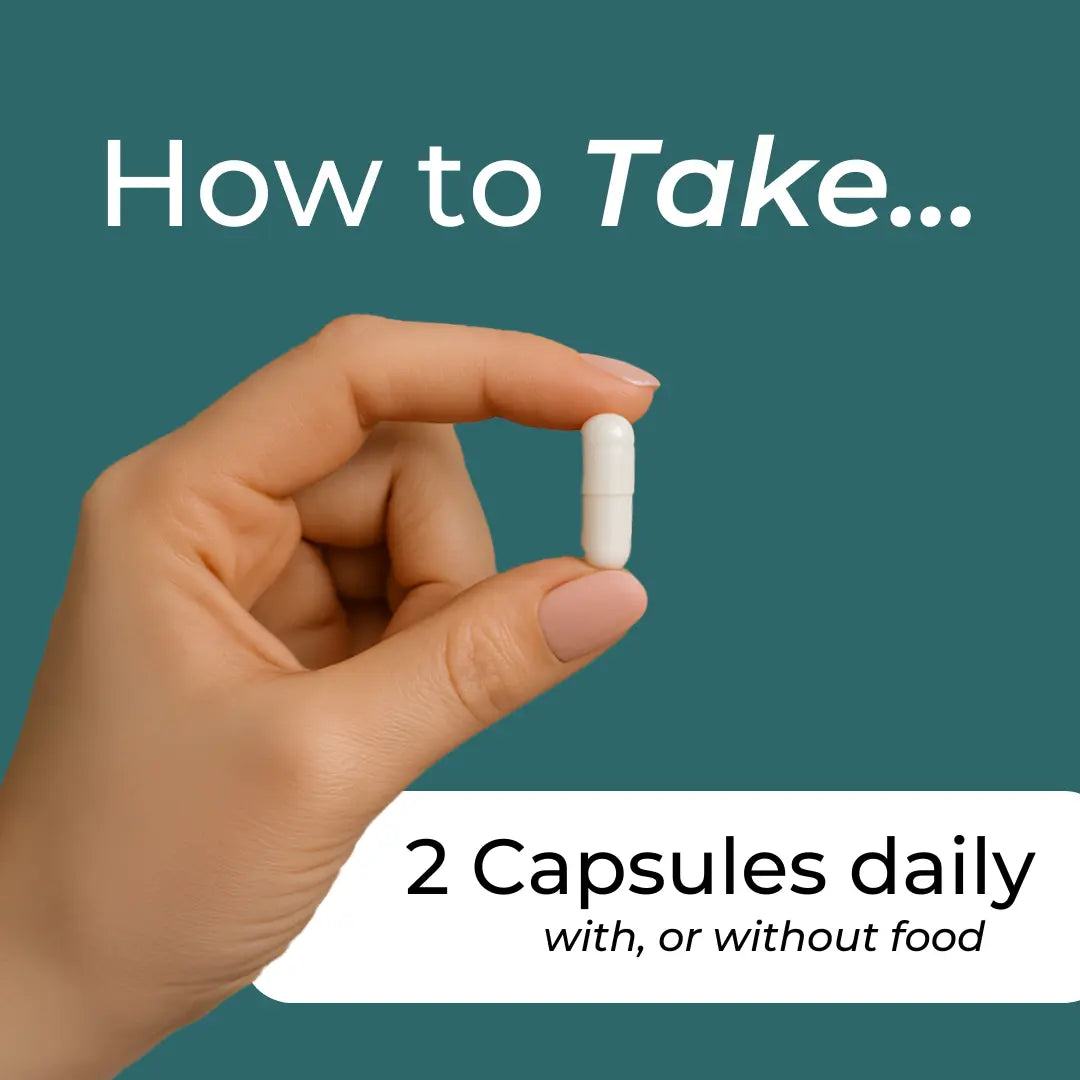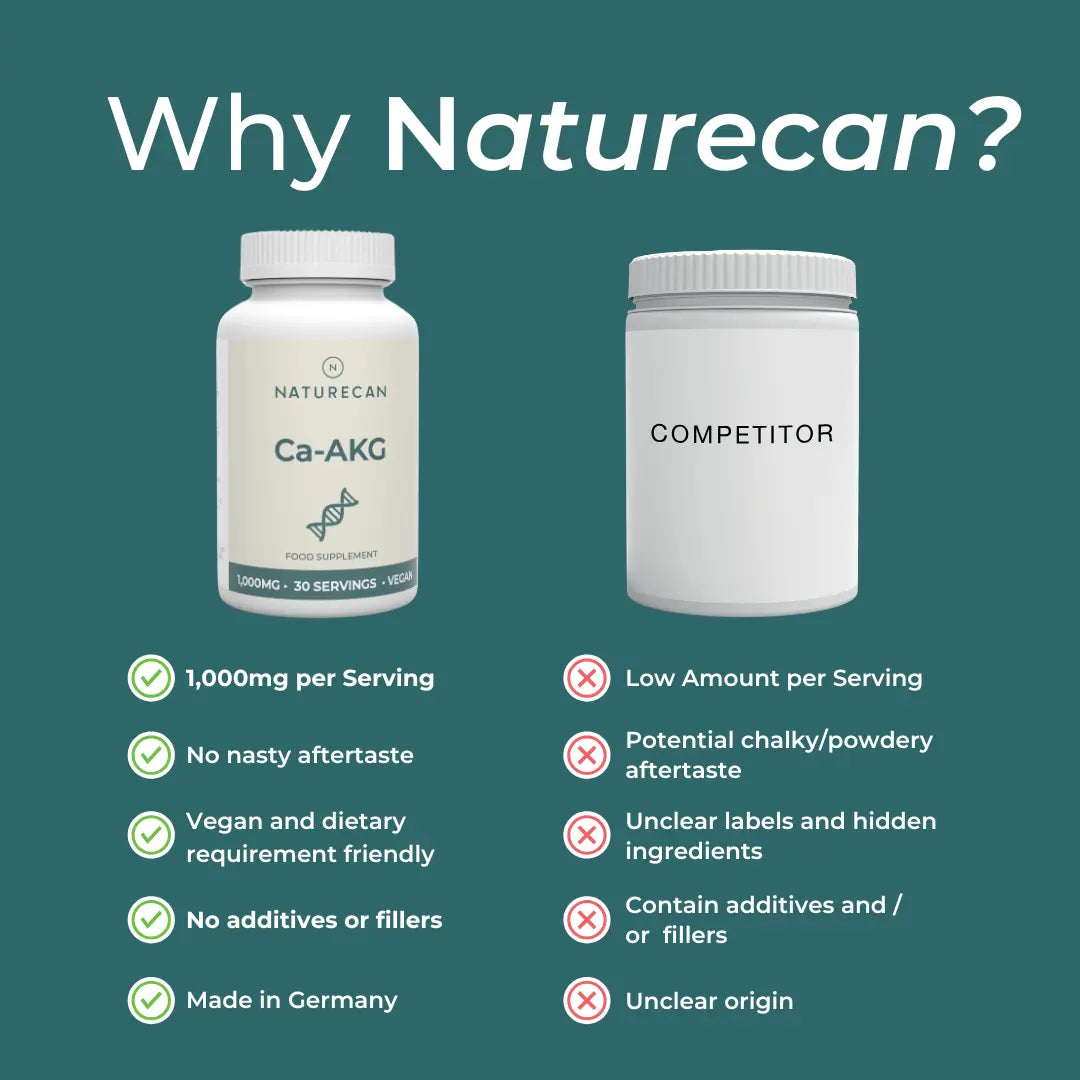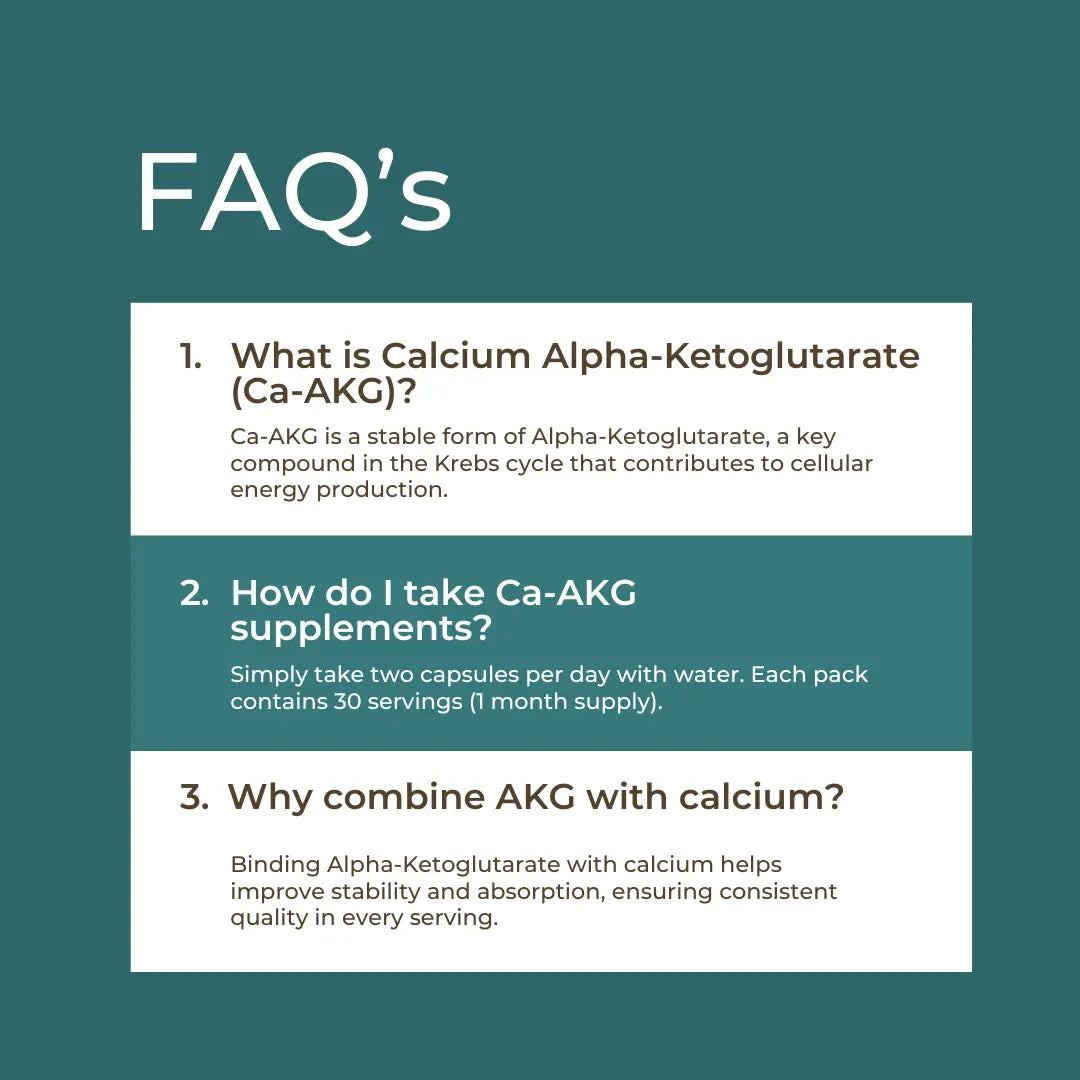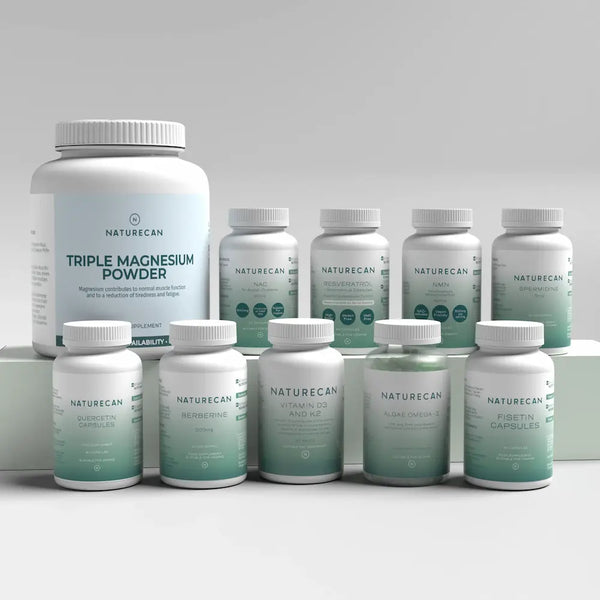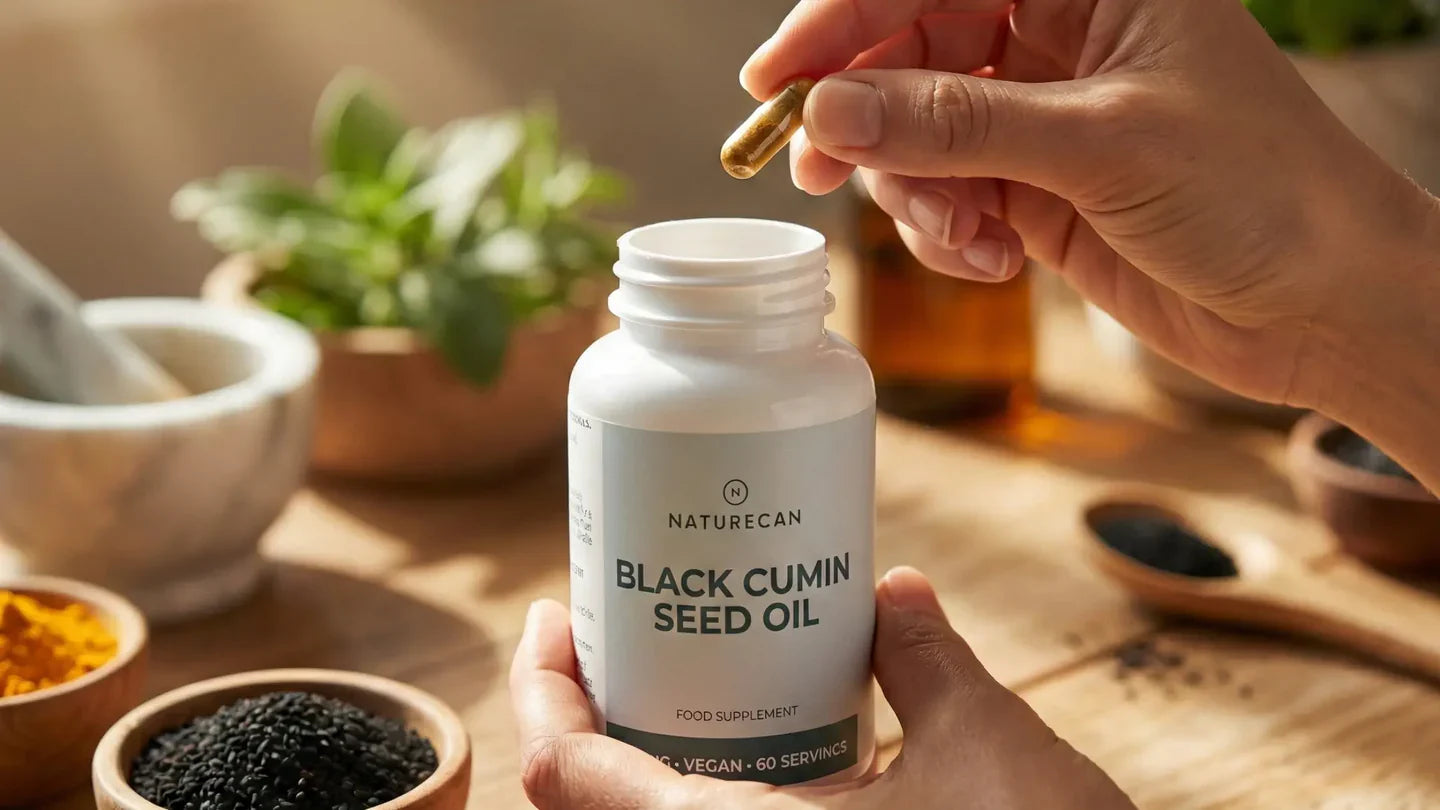What Is AKG? Why Alpha-Ketoglutarate Is Gaining Ground in Longevity Research

Written by Valeria Briancesco & Reviewed by Paul Holmes.
From science fiction to mainstream wellness, the science of ageing has never been more relevant. With millions searching for ways to live not only longer but better, a new generation of supplements is emerging—designed to target the biological processes that drive ageing.
One molecule gaining momentum in this field is Alpha-Ketoglutarate (AKG), a naturally occurring compound found in every cell of the human body. Crucial for energy metabolism and cellular health, recent research suggests AKG may also support healthy ageing and longevity¹.
At Naturecan, we're introducing Calcium Alpha-Ketoglutarate (Ca-AKG)—a stable, highly bioavailable form of AKG used in cutting-edge ageing studies. With promising data on mitochondrial function, and even bone support, Ca-AKG is quickly becoming a core component of modern longevity stacks.
In this article, we explore the science behind Ca-AKG, and why it might be a valuable addition to your long-term wellness routine.
What is Alpha-Ketoglutarate?
Alpha-Ketoglutarate (AKG) is a significant intermediary molecule in the Krebs cycle, the process by which your cells generate ATP—the body's energy currency⁵.
What Is the Krebs Cycle? The Krebs cycle, also called the citric acid cycle or tricarboxylic acid (TCA) cycle, is a fundamental metabolic pathway that occurs in the mitochondria of nearly all cells.
It plays a crucial role in the body’s ability to generate energy by converting carbohydrates, fats, and proteins into usable fuel in the form of Adenosine Triphosphate (ATP).
This process also produces key molecules that serve as building blocks for biosynthesis and cellular repair.
AKG plays a key role by donating and accepting electrons to enable efficient energy transfer.
This is especially relevant in ageing, as mitochondrial performance declines with age⁶. AKG’s role in the cycle makes it a promising target for longevity-focused research. It is also crucial for amino acid metabolism, detoxification, and overall metabolic homeostasis⁷.
Ca-AKG vs AAKG: What’s the Difference?
While both Ca-AKG (Calcium Alpha-Ketoglutarate) and AAKG (Arginine Alpha-Ketoglutarate) contain the AKG molecule, they differ in composition and purpose:
- Calcium AKG (Ca-AKG): This form combines AKG with calcium, enhancing stability and absorption. It is widely used in longevity research due to its sustained effects on mitochondrial function, cellular repair, and systemic health. Ca-AKG is best suited for those interested in ageing interventions and general healthspan support.
- Arginine AKG (AAKG): This combines AKG with the amino acid arginine. AAKG is popular in sports and performance supplements because arginine promotes nitric oxide production, which supports blood flow and muscle pump. It’s ideal for athletes looking to improve endurance and recovery.
Supplement Forms of AKG
Understanding the distinction between these forms helps guide supplement choice based on your wellness goals.
- Calcium AKG (Ca-AKG): Favoured in ageing research for its stability and bioavailability
- Arginine AKG (AAKG): Commonly used in sports nutrition for muscle recovery and nitric oxide production
- Free AKG: A general-purpose form supporting metabolic function
Calcium Alpha-Ketoglutarate (Ca-AKG) By Naturecan
Calcium Alpha-Ketoglutarate (Ca-AKG) is a next-generation supplement designed to support cellular health and healthy ageing. Known for its role in the Krebs cycle, the process that fuels energy production in our cells.
- Calcium contributes to normal muscle function
- Calcium contributes to normal energy-yielding metabolism
- 1,000mg per serving - high-strength dose
- Vegan-friendly, 30 servings per pack
How Alpha-Ketoglutarate Works in the Body
1. Energy & Mitochondrial Support
AKG supports mitochondrial function by enhancing ATP production, which gives cells the energy needed to maintain and repair themselves².
2. Detoxification & Nitrogen Balance
AKG helps eliminate excess nitrogen and ammonia from the body, supporting gut health, immune function, and liver detox⁹.
3. Gene Regulation & Anti-Inflammatory Activity
AKG serves as a cofactor for enzymes involved in DNA demethylation, influencing gene expression linked to ageing¹⁰. It may also help reduce inflammatory markers like NF-κB¹¹.

4 Potential Benefits of Alpha-Ketoglutarate
1. Healthy Ageing & Healthspan Support
AKG has demonstrated potential to slow physiological ageing in animal models¹, helping to compress morbidity and improve quality of life in later years.
Its role in epigenetic regulation and inflammation reduction¹¹ makes it a key candidate in promoting healthy ageing and extended healthspan. AKG is increasingly being studied alongside other longevity nutrients such as NMN Powder, Berberine, and Magnesium for synergistic benefits.
Additionally, AKG may support antioxidant defences by indirectly reducing reactive oxygen species (ROS) through enhanced mitochondrial function and improved cellular metabolism.
As oxidative stress is a key driver of cellular ageing, this antioxidant-like role adds further appeal to AKG as part of a comprehensive longevity strategy.
2. Energy, Performance & Recovery
While Alpha-Ketoglutarate is best known for its role in cellular energy and longevity, emerging evidence suggests it may also support exercise performance and recovery.
By enhancing mitochondrial function and helping regulate metabolic pathways, Ca-AKG may assist in reducing fatigue, promoting efficient energy use, and supporting post-workout repair.

3. Bone, Skin & Tissue Support
AKG contributes to bone metabolism and supports collagen synthesis, which is essential for skin elasticity and connective tissue health⁴.
In postmenopausal women, supplementation with calcium AKG has been associated with decreased bone resorption⁴.
Pairing with Silicium or Collagen may further support skin and bone integrity.
4. Gut & Immune Balance
AKG supports gut barrier integrity and modulates immune function, partly through its role in nitrogen metabolism5,9,13.
By reducing gut permeability and inflammation, it may help foster a healthy microbiome and improve immune resilience.


How To Improve Gut Health
Gut health isn’t just about your stomach. It refers to the overall well-being of your digestive system, particularly your gut microbiome, the trillions of bacteria and microbes living in your intestines. When your microbiome is diverse and well-balanced, it helps with digestion, nutrient absorption, immune support, and even mood regulation. But when it’s out of balance, it can lead to problems throughout your body.
Read MoreWhy Bryan Johnson Swears by AKG
When it comes to cutting-edge longevity routines, few are as meticulous—or as public—as Bryan Johnson. Known for his multimillion-dollar anti-ageing project “Blueprint,” Bryan takes a science-backed approach to tracking and optimising his biological age.
One standout from his supplement stack? Calcium Alpha-Ketoglutarate (Ca-AKG).
Bryan takes 1–2 grams of Ca-AKG daily, split between morning and midday doses. He includes it as part of a broader strategy to support mitochondrial health, reduce systemic inflammation, and extend his healthspan.
While clinical data is still emerging, AKG’s potential role in healthy ageing has made it a go-to for forward-thinking biohackers like him.
Curious about everything Bryan takes? Explore Bryan Johnson’s full supplement stack to see how AKG fits into his daily protocol.

Complete Longevity Bundle By Naturecan
Optimise your health long-term. Our Complete Longevity Bundle brings together ten of the best supplements for consistent healthy ageing and well-being, all in one convenient, cost-effective bundle.
- Supports cellular health and energy production
- Helps maintain cognitive function and brain performance
- Contributes to immune system and heart health
- More affordable than buying supplements individually
- Available in various monthly supplies
- Includes 10 different supplements
The Longevity Guide: Everything You Need to Know About Longevity


This is our complete beginner's guide to Longevity. We explain what it is, what studies are available, where it comes from, what it is used for, and a few other facts you may not know.
Summary Study Table
| Area of Research | Topic | Main Discovery |
|---|---|---|
| Longevity | Mice | +10% lifespan |
| Bone metabolism | Postmenopausal women | Reduced bone resorption |
| Muscle recovery | Trained men (AAKG) | Improved endurance/recovery |

Is Berberine a Natural Alternative to Metformin?
Berberine, a compound extracted from plants like Berberis and goldenseal, is gaining popularity as a potential natural substitute for metformin. But is berberine truly a natural alternative to metformin? This article explores how it compares, its benefits, and why a Berberine Supplement may be the ideal choice for those looking to support their blood sugar naturally.
Read MoreHow to Use AKG as a Supplement
Typical Dosages
Below is a simple overview of typical AKG dosing strategies depending on the form and intended purpose:
| Form | Purpose | Suggested Dose |
|---|---|---|
| Ca-AKG | Longevity support | 1g daily |
| AAKG | Athletic performance | 3–6g daily |
Improve Your Longevity Journey With Our Range
What’s the Best Type of AKG for Women?
When it comes to choosing the best form of alpha-ketoglutarate (AKG) for women, Calcium Alpha-Ketoglutarate (Ca-AKG) stands out as the top choice—especially for those focused on healthy ageing, metabolic balance, and overall vitality.
Unlike AAKG (Arginine AKG), which is popular in sports supplements for its nitric oxide-boosting effects, Ca-AKG is a more stable and bioavailable form designed to support cellular energy production, mitochondrial function, and age-related wellness.
It’s also gentler on the system and often paired with other longevity nutrients like NMN, Magnesium, and CoQ10.
Emerging research suggests Ca-AKG may help regulate inflammation and support epigenetic health—both of which are increasingly important for women navigating hormonal shifts and metabolic changes over time.
The inclusion of calcium in this form may offer additional benefits for bone health, particularly for women post-menopause.
In short, Ca-AKG is a versatile and well-tolerated option that complements a longevity-focused lifestyle—making it the ideal AKG form for women at any stage of their wellness journey.

Alpha-Ketoglutarate and Autophagy
AKG may promote a cellular environment conducive to autophagy by improving mitochondrial function and reducing inflammation³.
Autophagy is the body’s internal housekeeping system, responsible for clearing out damaged or malfunctioning components to allow for regeneration. Preclinical studies show AKG may activate autophagy-related pathways by influencing epigenetic processes and nutrient sensing mechanisms, including mTOR and AMPK¹².
These pathways play a crucial role in determining when a cell should initiate autophagy. While human trials are ongoing, AKG’s ability to support metabolic health and cellular clean-up makes it a compelling candidate in longevity research.
What the Research Says
With many key mechanisms, there are a large number of potential TMG benefits, including:
Safety and Side Effects
Alpha-ketoglutarate is generally well tolerated, but it’s important to recognise that research in humans remains limited.
Mild side effects may include gastrointestinal discomfort, bloating, or dizziness—especially when taken in high doses or on an empty stomach.
These symptoms are usually short-lived and not considered serious.
AKG should not be taken during pregnancy or breastfeeding without medical advice, and anyone with existing health conditions or on medications should consult a healthcare professional.
As of now, no health claims for AKG have been approved by the EFSA or FDA.
To ensure safety and effectiveness:
- Choose third-party tested products
- Opt for Ca-AKG for ageing and AAKG for sports performance
- Avoid proprietary blends with undisclosed dosages
If you have any existing health conditions or are pregnant or breastfeeding, be sure to speak to a professional before incorporating spermidine into your routine.

Conclusion – The Future of AKG in Longevity Science
Alpha-Ketoglutarate is emerging as one of the most promising compounds in the field of healthy ageing.
Although human trials are still limited, preclinical studies on lifespan, inflammation, and mitochondrial function are compelling.
As part of comprehensive longevity strategies, AKG may soon become a widely recommended nutrient.
At Naturecan, we are proud to provide science-backed educational content and high-quality supplements to help you take control of your health journey. Always consult a healthcare professional before starting any new supplement.
FAQs
What is Alpha-Ketoglutarate used for?
- May support cellular energy production and mitochondrial function
- May help detoxify ammonia and maintain nitrogen balance
Could enhance exercise recovery and performance
- May promote healthy ageing and support metabolic homeostasis
Can Ca-AKG slow ageing?
Animal studies suggest Ca-AKG may extend lifespan and reduce frailty¹
Influences epigenetic regulation and inflammation pathways linked to ageing¹2
More human clinical trials are needed to confirm long-term benefits
What’s the difference between Ca-AKG and AAKG?
Ca-AKG (Calcium Alpha-Ketoglutarate): A stable, bioavailable form of AKG used in longevity supplements to support mitochondrial function, metabolic health, and healthy ageing.
AAKG (Arginine Alpha-Ketoglutarate): A sports-focused form that combines arginine with AKG to boost nitric oxide levels, often taken to enhance workout performance.
When should I take Ca-AKG?
Ca-AKG can be taken at any time of day, with or without food.
For best results, it’s often included in a morning or midday supplement routine alongside other longevity ingredients like NMN, Magnesium, or CoQ10.
Can I combine AKG with NMN or other longevity supplements?
Yes, many longevity supplements include AKG alongside NMN, Berberine, Magnesium, and Vegan Omega-3 These combinations may support cellular energy, inflammation regulation, and metabolic balance.
Read more in our guide on GLP-1 Support and Glucose Health

Reviewed by Paul Holmes
Director of Science and Innovation at Naturecan
Testing for large pharmaceutical & tobacco companies, Paul has built a wealth of scientific and regulatory knowledge, working on regulatory submissions to bodies such as the FDA and the MHRA.
He holds a BSc in Medicinal and Biological Chemistry and sits on the UKAS CBD Food Product Approval Expert Group.


